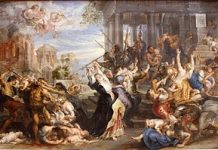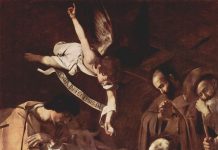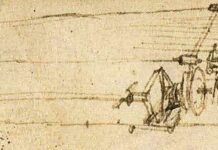Today, November 14 2021, is the feast day of the first Croatian canonized saint, the Franciscan St Nicholas Tavelić.
Nikola or Nicholas was likely to be born between 1340 and 1350 in Šibenik. His biography does not tell us specifically what his childhood was like and, most importantly, what motivated him to embrace the Franciscan order. But one thing stands sure: when he felt the call he did say Yes to it.
When Nikola finished his theological studies, St Bartul Alvernski (Bartholomew of Alvern), who, in those days, was at the helm of the Bosnian Franciscan fraternity, pleaded upon the request of Pope Gregory XI in order that sixty good and educated friars would spread the Gospel in Bosnia. Considering that this country was governed by Tavelić’s fellow-countrymen and most seemingly cousins, the powerful Šubić family, this might have caught attention of the young Nikola. Thus, he too left for Bosnia.
At the time, the Bosnians were mainly Bogumils. Nikola spent some twelve years within the Bosnian territory rejoicing in the conversion which took place as well as grieving when these failed to occur. Adversity and problems were not alien to him. Moreover, hostile climate and difficult terrain were a simple reflection of the harshness of life together with the closeness of the human heart.
Despite the fact that Bosnia was, indeed, a missionary country, the Franciscans were convinced that the missions among the dangerous Saracens were more difficult. As a matter of fact, of all the pagans, the Rule of the Franciscan Order names solely the Saracens by name. It was St Francis of Assisi himself who went to the Holy Land to convert them. On his holy and most convincing example Nikola waited for the same opportunity to come and seized it.
As soon as he reached Jerusalem, Br Nikola immediately started to draw others closer to Jesus too. That was why he went to Bosnia and it was with the same holy intention of converting others to Jesus that he set sail for Palestine. Following a lengthy examination and discussion with his brothers regarding preaching to the Saracens, the risks of such an operation, justification of putting his life in danger of being martyred while bearing in mind Paul’s words, Woe to me if I do not preach the Gospel, Nikola decided that for him life is Christ and death a victory.
Backed by his faithful Franciscan brother and friend Fr Deodatus from Ruticini, who shared with him the joys and hardships of life whilst in Bosnia, and two other Franciscan brothers, Nikola fearlessly started preaching Christ openly. They were convinced that they would convert the Saracens if they managed to convert, first and foremost, their leader, the qadi. Thus, empowered by the Spirit they first went to the qadi just emulating the example of the founder of the Franciscan order. Initially, the story had the same route. As St Francis’ word was ignored even their word was. However Francis’ story ended peacefully whereas theirs ended in torture, harsh imprisonment and, eventually, execution.
In this way Nikola attained his crown of martyrdom and became a role model for others who, in the course of the centuries that were to come, walked the same road of martyrdom due to their faith, trampled on, mangled, impaled on a stake, burnt in the fire of their own homes, suffocated in their own blood until all that was left was ‘the remnants of the remnants’, ‘weeping’ ‘dry as stick’, a small and repressed Croatia.
In 1889 Nikola was beatified and on June 21, 1889, Nikola was beatified whilst in 1970 he was officially canonized as the first Croatian saint. Let us now appreciate the Godly heroism of these four Franciscans as narrated in a contemporary account which tells us of their martyrdom.
Nicholas and his companions had discussed for a long time how best they might win souls for God when the devil was seeking to destroy them; how best they could offer the most High God an abundant harvest in this Holy Land of Jerusalem. They took advice from theologians and proven brethren living in Jerusalem, armed themselves with arguments from Scripture and biblical scholars they had read elsewhere and felt strengthened in the Lord as to how a perfect man might successfully confront men of the world. So it came about that on the feast of Saint Martin, 11th November 1391, about the third hour, they set aside their fears and decided to put into effect, step by step, what they had long been planning. So they set out together, each bringing with him a sheet or roll written in Italian and in Arabic. They went first towards the temple of Solomon (the Mosque of the Rock), but were stopped when they tried to enter.
Brought to the house of the Cadi, they immediately produced their rolls and began to read them before him. Then, the Cadi addressed them thus: “These words which you have just read to me, did you say them as wise and prudent men in possession of your wits, or as fools who have lost all mind and reason? Were you sent here by your Pope or by some Christian king? ” The friars answered in great seriousness and gentleness, yet with great zeal and a desire to bring him to salvation: “We have not been sent by any man,” they said, “but by God alone, who has deigned to inspire us to preach to you and show you the truth whereby you may be saved; for Christ says in his Gospel: ‘He who believes and is baptized will be saved; he who does not believe will be condemned.”” Then the: Cadi asked them: “Do you wish to retract all that you have said and become Saracens ‐ and so save your lives? For otherwise you are going to die.” They answered in a loud voice: “By no means do we take back what we have said. Nay rather, we are ready to die for the truth we have proclaimed, and in defence of the Catholic faith we would rather die and suffer all manner of torment, because all that we have said is holy, Catholic and true.” When the Cadi heard these words, he and his council passed sentence of death upon them!
Hardly had the judgment been uttered when all the Saracens who had gathered near the house rose up with a great shout: “To death with them! Let them die!” They fell on the friars and beat them with whatever they had at hand, so that they fell to the ground half‐dead. This was about the ninth hour, and due to the popular outcry, they lay there until midnight.
Then about midnight the Cadi had them stripped naked and tightly bound to stakes and so cruelly beaten that there was not a sound spot left on their bodies and they were too weak to stand. Then the Cadi had them taken to a dark dungeon and securely bound in wooden stocks, so that they could have no respite or relief, but be in constant pain and torment.
Finally, on the third day they were led out into the square where criminals were usually punished, before the Emir and the Cadi and an immense crowd of Saracens and soldiers with drawn swords and scimitars, and a great fire blazing in the centre. Once more they were asked if they wished to renounce what they had said and become Saracens and so escape death. They answered: “No, this is what we want, and we tell you again to be converted to the faith of Christ and be baptized. Know that for Christ and his teachings we fear neither fire nor bodily death.” When the crowd of Saracens heard these words, they were beside themselves with anger and all rushed upon them, hacking them so to pieces with their swords that nothing human could be recognized in what remained. They then threw them into the fire; and yet their bodies thus dismembered refused to burn. And through that whole day long the crowd did not abandon this marvelous sight, but kept adding to the fire, scattering the ashes and hiding the bones lest the Christians should find them again.
St Nicholas and his companions invite us to seriously ask the following question both individually and collectively: How am I ready to suffer for my Catholic Faith? What kind of an existential answer are we going to give to this very important question?
O God, you glorified blessed Nicholas and his companions with zeal for spreading the faith and by the palm of martyrdom. Grant us, we beg you, through their example and intercession to hasten in the way of your commandments, so that we may merit to receive the reward of eternal life. We ask this through our Lord Jesus Christ, your Son, who lives and reigns with you and the Holy Spirit, one God, for ever and ever. Amen.










